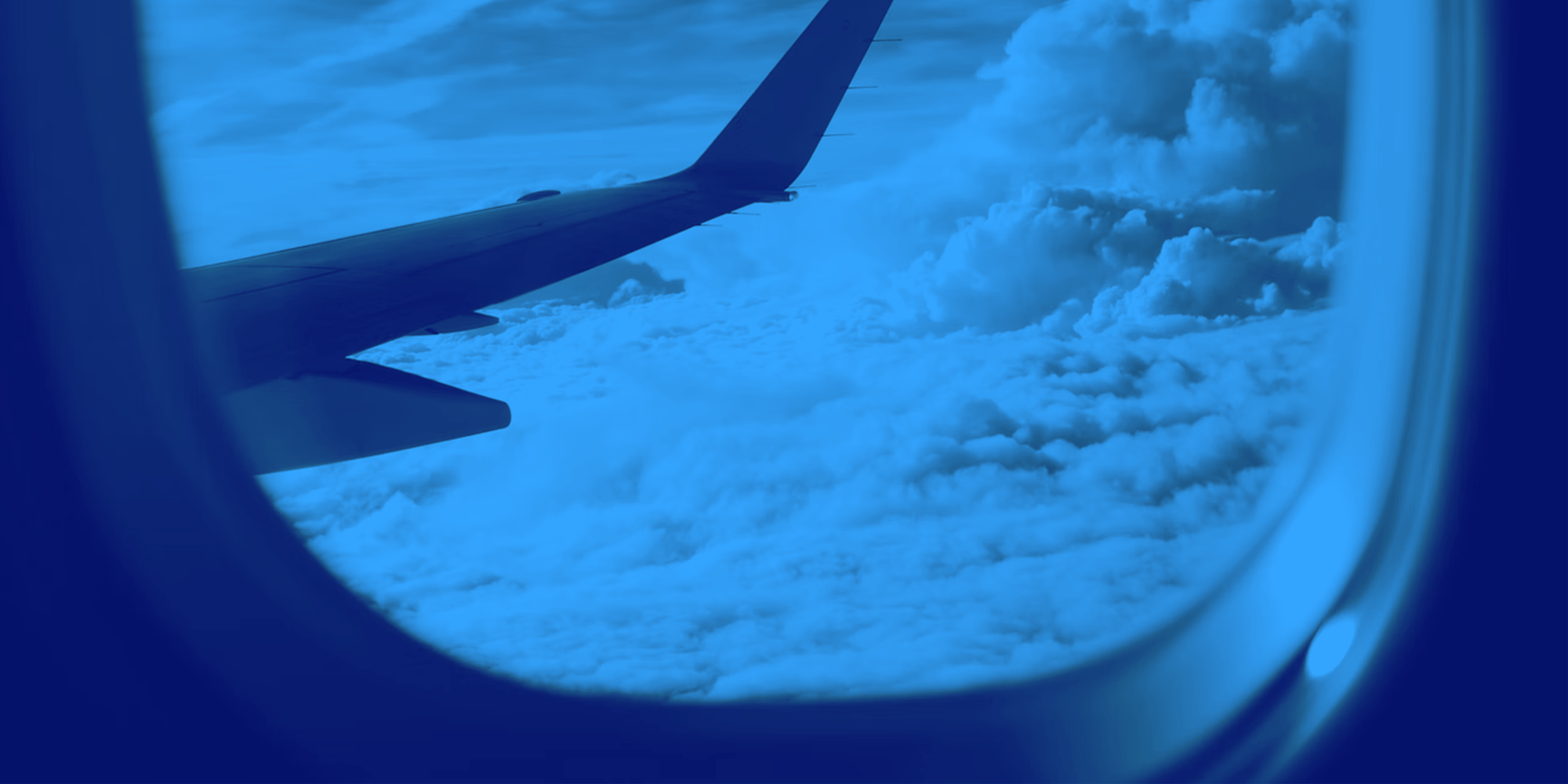The future of travel is now and brands are optimistic
According to American Express‘s 2021 Global Travel Trends, customers’ perceptions of luxury amenities shifted amidst the pandemic, with high cleanliness standards becoming a top-tier benefit. Brands tapped into this trend by focusing on customer safety and wellbeing in messaging.
Many brands utilized an optimistic tone in messaging, looking forward rather than looking back. As customers became more comfortable with future travel plans, brands were there to be the vote of confidence they likely needed.
Homeshare brands specifically took a more sentimental approach to marketing. Airbnb and VRBO tapped into national TV spots to showcase how their respective accommodations allow people to spend time with the ones they love.
Safety first
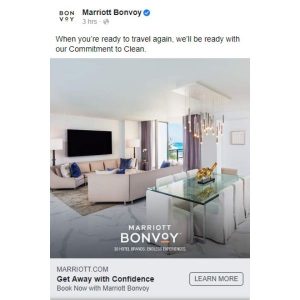 Marriott Bonvoy led with its Commitment to Clean standards across media channels to reassure customers that booking a room was safe
Marriott Bonvoy led with its Commitment to Clean standards across media channels to reassure customers that booking a room was safe
Marriott hoped to instill confidence in customers by focusing on its Commitment to Clean initiatives. Its website states that this consists “of in-house and outside experts in food and water safety, hygiene and infection prevention, and hotel operations” which are redefining cleaning and safety standards.
The brand’s messaging also highlighted “your getaway is just a drive away,” which aligned with customers’ comfortability with road trips.
Hyatt spotlighted flexibility and peace of mind, while also offering unique experiences
Hyatt comforted customers by making their safety a priority. Its website boasted GBAC STAR cleanliness, trained hygiene and wellbeing leaders, and a cross-functional panel of medical and industry advisors.
In October, Hyatt began promoting its Work from Hyatt packages, offering customers the unique experience of a new office space for the day or the ability to stay for a month. The hotel wanted to give customers a way to put joy back into their everyday.
Airline brands integrated safety precautions within ads that encouraged customers to book flights
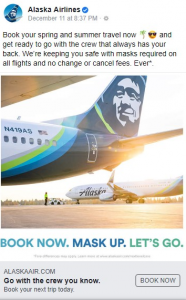
“Book now. Mask up. Let’s go.”
Alaska Airlines encouraged customers to book spring and summer travel by promoting its mask requirement alongside no change or cancellation fees, hoping its commitment to safety would be enough to drive bookings.
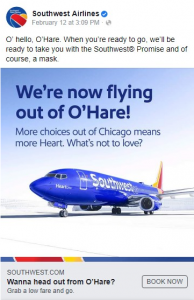
“…and of course, a mask.”
Southwest Airlines announced it would now be flying out of O’Hare airport in Chicago, letting customers know that when they were ready to fly, the airline was waiting with its Southwest Promise and added safety precautions.
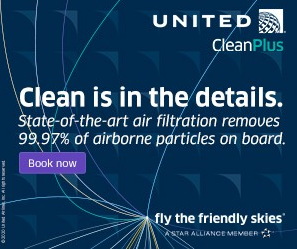
“Clean is in the details.”
United Airlines promoted its CleanPlus program by informing customers that its air filtration removes “99.97% of airborne particles on board,” looking to solidify customer safety during flights.
An optimistic attitude
Brands were forward-looking, extending optimistic messaging around future travel
American Express sent emails featuring its “Power Pair Promotion,” which included a $100 statement credit paired with 100k bonus points for its Hilton Honors Card. Messaging encouraged sign-ups through hope for the year ahead.
JetBlue tapped into customer emotions by pushing them to reconnect with family and friends this year. The email continued on with safety measures and no change or cancellation fees to instill confidence in consumers’ decision to fly.
Booking and hotel brands took to email to highlight their respective spring break promotions, but with different strategies
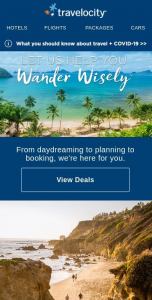
Travelocity
Travelocity looked to inspire customers’ spring break plans by their location, encouraging customers to “read more” about where each state prefers to spring break, and teasing that “the answer may surprise you.”
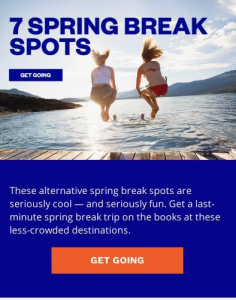
Wyndham Hotels & Resorts
According to Amex’s 2021 Global Travel Trends, “69% of respondents are interested in visiting lesser-known destinations.” Wyndham tapped into this trend by spotlighting “less-crowded destinations” in its spring break promotions.
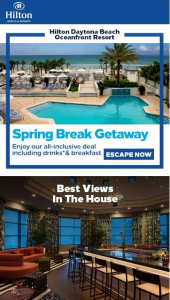
Hilton
Hilton looked to inspire the ultimate, all-inclusive spring break getaway in location-specific promotions. In this case, it featured its Daytona Beach Oceanfront Resort and paired the imagery with an “Escape Now” CTA to drive bookings.
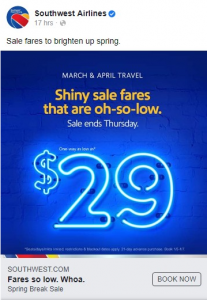 Brands resonated with different consumers while centering their messaging around price
Brands resonated with different consumers while centering their messaging around price
Southwest looked to drive bookings by focusing on its low fares. It paired its low $29 cost with a “sales ends Thursday” message, hoping to attract price-conscious consumers with a sense of urgency.
Meanwhile, Marriott Bonvoy aimed to reach customers who have been guarded when it comes to travel, reassuring them they could “ease back into travel” with calming imagery that showcased social distancing and highlighted “best available rates.”
Homeshare takes a sentimental approach
Airbnb played into customers’ emotions with new commercials promoting travel experiences made possible through Hosts.
VRBO spiked TV spend around the holiday season, encouraging customers to “bring the holidays to a VRBO vacation home.”
What we think
There is pent-up demand for travel as consumers become more comfortable with the idea of venturing out amidst the COVID-19 vaccination rollout. Still, some people may be more comfortable than others with the idea of travel and that’s where brands can step in with added encouragement. Many people are likely looking for reassurance during this time, so brands keeping safety measures at the forefront will go a long way with these consumers.
Travel brands can also pair hard-to-pass-up promotions with benefits such as no change or cancellation fees, as 56% of consumers said they miss travel so much they’re willing to book even if they have to cancel. This way, even in unprecedented circumstances, customers can move confidently ahead with future travel plans.


